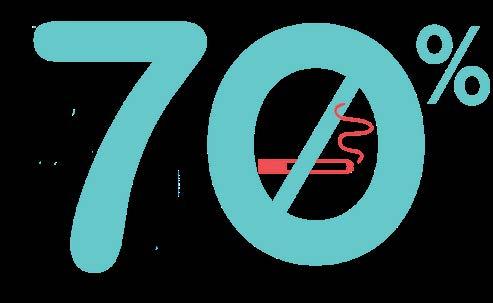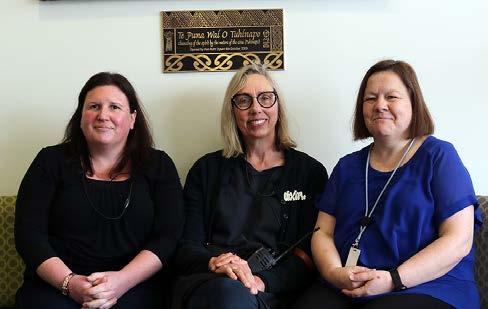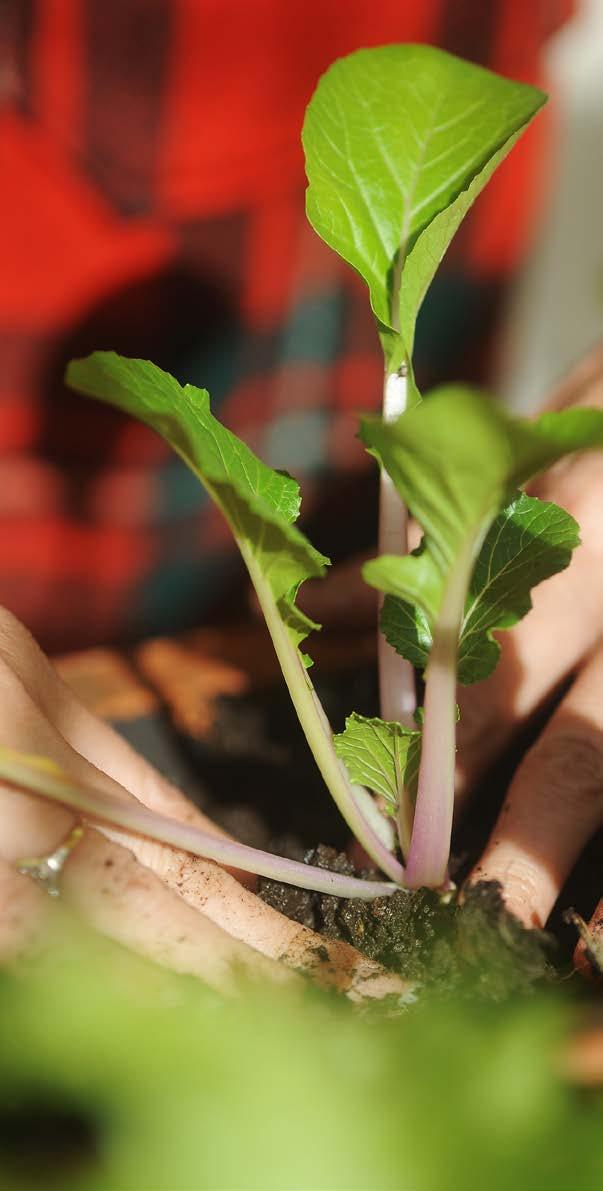
6 minute read
Homecare Medical (Continued
Homecare Medical Continued
In the last 12 months (ending 30 June 2020) over 825,582 contacts were made to the National Telehealth Service - those contacts came from 556,933 people (1 in 10 people in NZ). A further 207,325 COVID-19 contacts were answered in the four months between 1 February and 30 June 2020, taking the total contacts answered through NTS services during FY20 to over 1million contacts.*
Key services
The 1737 need to talk? service answered over 123,000 contacts and supported more than 59,000 people in distress The Quitline team answered more than 50,000 contacts supporting more than 11,600 people start their quit journey, with 29% remaining smoke free after 4 weeks The Alcohol and Other Drugs team answered 19,394 contacts supporting 16,250 people with addiction within their family The Poisons team helped 24,000 people, with 76% of contacts requiring no further medical treatment or selfcare information The Emergency Triage nurses triaged nearly 45,000 incidents, redirecting 51% of contacts to nonemergency services, which helps keep our hospitals and ambulances available for emergencies The Gambling team received nearly 4,300 contacts supporting 3,300 people dealing with the effects of problem gambling More than 100,000 people accessed and interacted with The Journal
website tools The Emergency Mental Health Response team triaged over 11,000 contacts from Police and Ambulance to support more than 8,000 people in social and psychological distress.
Supporting New Zealand’s COVID-19 Health Response
The National Telehealth Service COVID-19 response began on 7 February, with the establishment of a dedicated phone service available 24/7. The team provided to a central front door for COVID-19 related health advice and information to the public. It was launched at a time when many general practices were overloaded.
Over time, this service has extended to supporting people in self isolation, support with contact tracing as required, provision of mental health support, and a clinical advice line to support community-based practitioners.
At its peak 207,325 COVID-19 contacts were answered. In the four months between 1 February and 30 June 2020 the team answered 14,000 contacts in one day.
During COVID-19, more than 770 extra people were engaged and trained, five new contact centres (eight in total) were set up to enable physical distancing while we responded, and a five-month technology project was delivered in just seven days, increasing infrastructure by six times, to accommodate increased demand.
Critical to achieving this were the strong relationships and support from our health partners, including Homecare Medical’s owners, Pegasus and ProCare.
COVID-19 Clinical Advice Line
In early April, on behalf of the Ministry of Health, the National Telehealth Service established a COVID-19 clinical advice line – on 0800 177 622 – for general practice, pharmacy, nurses, midwives and aged residential care providers. The line operates 8am - 7pm, from Monday to Saturday.
The helpline offers general advice about the management of COVID-19 and is staffed by primary care nurses, pharmacists and GPs, with at least one GP on every shift. Most calls are initially managed by a nurse, with a GP available at all times to provide specialist advice as well as access to additional clinical support. Having a dedicated number ensures that community clinical staff can access advice directly from peers.
Supporting General Practice
Homecare Medical offers general practices an after-hours, nurse-led triage service.
Over the last 12 months, Homecare Medical handled more than 100,000 clinical calls from patients calling their medical home; and of those they managed 85% with primary care and/or selfcare advice; 8% required urgent care; and 6% required emergency services (111 and ED). The services help to reduce unnecessary presentations to emergency departments and strengthen general practice as the front door to primary care.
Virtual GP Kits
Homecare Medical worked with ProCare and Pegasus clinicians and practices to design and road-test protypes for an innovative ‘Virtual GP Kit’. In mid-March the Virtual GP Kits - including webcams - were made available to Canterbury and Auckland general practices to provide everything a practice needs to begin delivering virtual consults. Homecare Medical fast-forwarded the roll-out to meet the pressures of COVID-19. GPNZ has made the Virtual GP Kit model available country-wide.
Mental Health After-Hours
In August 2019, Homecare Medical commenced a Mental Health After-Hours contract with the Canterbury District Health Board (CDHB). Registered mental health nurses provide tele-triage cover afterhours: between 4:30pm and 12:00am from Monday to Friday, and between 10:30am and 12:00am on weekends and public holidays. The contract provides acute triage service and associated pathways. Non-acute pathways continue
to be managed by the Canterbury DHB Mental Health and Addictions team.
The service received 11,001 calls between its establishment to 30 June 2020. Service users increased each quarter. Of the calls answered, 4.3% required Category A (Police or ambulance) attention; 26% of answered calls required very urgent, urgent, and semi-urgent mental health responses (categories B, C, and D); 33% were category E, non-urgent calls; and referral to non-mental health services and advice/ information responses (categories F and G) were required for 37% of calls.
Puāwaitanga
Homecare Medical’s telephone and digital counselling service – Puāwaitanga (meaning to bloom or grow) - was established almost two years ago and is based on a pilot study called eTalk initiated by the Canterbury District Health Board.
Puāwaitanga enhances general practice mental health service capacity and offers counselling outside normal office hours, including weekends. The service offers referred clients a package of care for up to 12 months. Users select their preferred counsellor and session time via an online portal. It achieved an 87% Māori conversion rate from referral to engagement in the last year. Māori make up 25% of its client base. Other service users comprise: New Zealand European (54 percent); Pasifika Peoples (6%); Asian (7%) and other European (5%); and other (5%).
Pegasus patients comprised 21% of all Puāwaitanga registrations.
Puāwaitanga services are increasing to meet demand. There are currently 20 registered psychotherapists, psychologists, occupational therapists, counsellors, mental health nurses, social workers, addiction practitioners and ACC registered therapists, offering services in over 15 different languages.
Outcomes for all clients are positive with the average DUKE Score increasing by 31 percent for Māori clients and by 26 percent for all other clients in the last year.
Current referring organisations include Canterbury District Health Board, Ministry of Social Development, Central PHO, ProCare, Auckland University of Technology and the University of Auckland.
Service User Feedback
“I was … at ease immediately and felt I was listened to and given expert advice”Healthline “She gave me the confidence to make the next decision.” Healthline “Fantastic. She took care of me holistically, thinking about my mental wellbeing.” COVID Healthline “Wonderful service.” – COVID Healthline “I am very thankful for the help. I am now on the road to recovery.” 1737 “It helped me immensely. Thank you.” 1737 “You helped save my life.” 1737 “Just a big thank you. I haven’t had a smoke since my quit day and I don’t know I could have done it without your help.” Quitline “It was great getting your encouraging texts and support. I am one-year smoke free. Thanks.” Quitline
National Telehealth Service 2019/20
A total of 825,582 contacts were answered - more than 36,800 contacts above forecast in the annual plan and 12% increase on FY19 contacts.
Those contacts came from 556,933 people (1 in 10 people in New Zealand).
In addition to the answered contacts, more than 215,000 outbound contacts were also made across the NTS services in the year ending 30 June 2020.
A further 207,325 COVID-19 contacts were answered in the four months between 1 February and 30 June 2020, taking the total contacts answered in FY20 to over 1 million.





